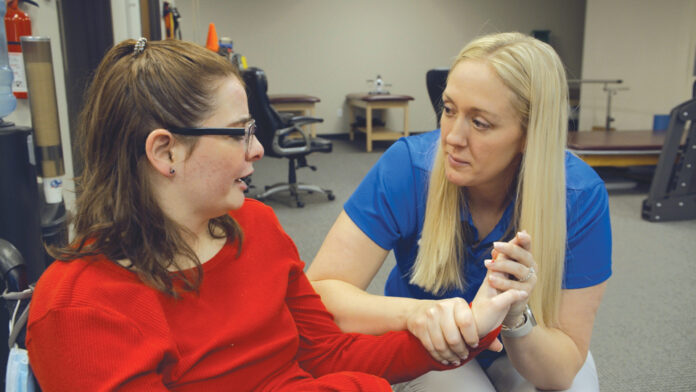
Oklahoma woman battles a rare and debilitating disease
Story and photo by Jake Strickbine, contributing writer
We tend to take for granted things — things like our ability to walk or to tie our own shoes — until we can no longer do those things.
Emily Rogec lives that reality, and she is grateful for every movement she can still make.
Diagnosed at just six years old with a rare disorder that attacks the nervous system, the Purcell woman was in a wheelchair by 12. Friedrich’s Ataxia is so rare it impacts only one in every 50,000 people in this country.
“It’s progressive,” said Tracy Weidman, Emily’s mom. “It doesn’t just affect her walking. It’s her hands. It’s her throat. It’s her heart. It’s anything that’s muscle.”
The odds may be stacked against her, but Emily is now 27 and proves every day that she is a fighter. Emily has also found a powerful ally in Taylor Marcum, a physical therapist at Valir PT in Purcell.
“Emily’s disease affects the nervous system. So, it affects her physically, but mentally, she is sharp as a tack and witty,” Marcum explained.
Marcum admits she had not heard of Friedrich’s Ataxia before meeting Emily, but she has worked to learn more about the condition. Using that knowledge, Marcum has developed a program to help Emily retain movement.
“I think it helps with my core and a little bit with strength,” Emily said with great effort. Even the ability to talk is impacted by her disease.
Using her knowledge and skills as a physical therapist, Marcum targets specific areas of the body to help Emily maintain as much independence as possible. Her mom has seen the positive changes firsthand.
“Physically, she can hold things better,” said Weidman. “When we’re working with her hands, when I need to pick her up to transfer her, her muscles are working a little bit better. It just kind of gives her a better quality of life.”
In addition to helping with strength and movement, physical therapy helps target the pain Emily experiences as a result of sitting in a wheelchair all day.
Emily believes the team at Valir and the work they are doing together is making a difference.
“It helps my muscles contract a lot and I do think my arms are getting a little bit stronger with some of the exercises we do,” she said.
Each small gain is a big victory against a debilitating disease.
“I think for us to be able to help her in any way, shape or form that we can, whether it’s sitting more upright in her wheelchair or getting stronger – anything we can do to improve her quality of life is just a reward for everyone,” Marcum said.
Although there is no cure for Friedrich’s Ataxia, with the help of the team at Valir PT in Purcell, Emily plans to do all she can to fight back. And she remains grateful for every movement she can still make.














